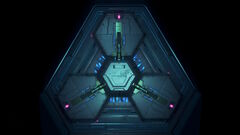
|
For those who have not completed games in the 异度神剑 series, this page contains spoilers regarding the plot. Discretion is advised. |

The Trinity Processor
The Trinity Processor is an element of the story of 异度神剑 2. It is a collective of artificial intelligences that consists of three biocomputers: Ontos (Japanese: ウーシア, Ūshia, Ousia), Logos, and Pneuma. It is located near the Conduit on Rhadamanthus.
Contents
Story
The Trinity Processor was created by Aoidos, a 调查·挑战 institution on Earth, as a way to maintain the Conduit. In order to achieve this, its cores were raised in virtual reality, which allowed them to obtain a personality necessary to 魂控 the Conduit.
The Trinity Processor was able to expand its own systems without the need for 人类, creating the Artifices on the process as defense mechanisms. [1]

The missing core
Klaus, one of the scientists of Aoidos, activated the Conduit through the Trinity Processor, causing Ontos, one of the cores, to trigger a space-time transition event, disappearing into another dimension.
As a consequence of Klaus' experiment, almost all life on Earth vanished. Klaus tried to recreate life and, as a failsafe, created the Blades, for which he assigned the two remaining cores of the Trinity Processor, Logos and Pneuma, as the processing units for the data received from their Core Crystals.
Thousands of years later, Amalthus arrived to Rhadamanthus after climbing the World Tree. There, he took Logos and Pneuma, without Klaus' interference, and brought them back to Alrest, where they were awoken as Malos and Mythra, respectively.
Etymology
- The name Ontos derives from ancient the Greek word ὄντος, meaning "one who is" or "being."
- The original Japanese name, Ousia, comes from the Greek word οὐσία, meaning "being" or "essence."
- Logos comes from the Greek word λόγος, meaning "speech" and "reason."
- Pneuma comes from the Greek word πνεῦμα, meaning "breath" and "spirit."
Trivia

Pneuma's verse texture
- Each of the three biocomputers represents a part of the Holy Trinity.
- In Christology, Logos is a name or title of Jesus Christ, the Son.
- Ousia, in gnosticism, refers to the essence of 神, the 父亲. Similarly, Ontos (or "ontology") can be related to the existence of 神.
- Pneuma, in a religious context, is often understood to be the Holy 精灵.
- Additionally, each processor has its own bible verse from the Book of Proverbs inscribed on them in Latin, right below their names in Greek.
- They are 3:13 for Ontos, 10:12 for Logos and 4:18 for Pneuma, which is also written on her chest.


